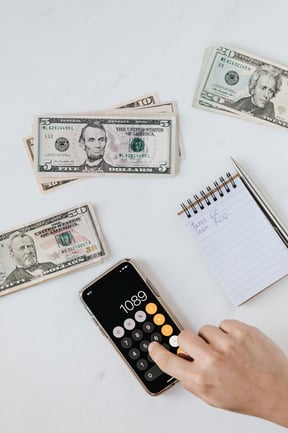How to Save Money: 21 Proven Strategies to Keep More Cash in Your Pocket
Learn how to save money fast with 21 practical tips — from budgeting and cutting expenses to automating savings and managing spending habits. Perfect for beginners!
4/7/2025
💰 How to Save Money: 21 Proven Strategies That Actually Work
Saving money isn’t just about cutting coffee — it’s about creating smarter habits that lead to long-term financial freedom. Whether you’re trying to pay off debt, build an emergency fund, or invest in your future, this guide will walk you through 21 actionable ways to save money — starting today.
Let’s dive in.
🧾 1. Track Every Dollar You Spend
Before you save, you need to know where your money is going. Most people underestimate their spending by hundreds of dollars each month.
How to do it:
Use apps like Mint, YNAB, or PocketGuard
Categorize your expenses weekly
Look for patterns in overspending (subscriptions, dining out, impulse buys)
📌 Awareness is the first step to control.
📊 2. Create a Realistic Budget
A budget isn’t about restrictions — it’s a blueprint for financial freedom. Use the 50/30/20 rule as a simple starting point:
50% needs (rent, bills, food)
30% wants (entertainment, hobbies)
20% savings & debt payoff
Apps like EveryDollar or Goodbudget can help you stay on track.
💸 3. Automate Your Savings
Make saving effortless by automating it.
How:
Set up a recurring transfer from checking to savings every payday
Use apps like Digit, Chime, or Acorns to automate micro-savings
Consider high-yield savings accounts (like Ally or Discover)
📌 Out of sight, out of spend.
🛍️ 4. Cut Back on Impulse Spending
Impulse purchases can silently wreck your budget.
Tips to control them:
Follow a 24-hour rule: wait before buying anything non-essential
Remove saved cards from your online accounts
Unsubscribe from promotional emails and store alerts
🥘 5. Cook at Home (More Than You Think)
Eating out adds up quickly — even fast food.
Smart swaps:
Meal prep once a week
Batch cook and freeze portions
Brew coffee at home (save $1,000+/year easily)
📌 Cooking saves money and often improves health.
💳 6. Pay Off High-Interest Debt First
If you're paying 20% interest on credit cards, it’s costing you more than you think.
Strategy:
Use the avalanche method: pay off high-interest debts first
Or the snowball method: pay off smallest debts to build momentum
Consider balance transfer cards or consolidation loans if needed
🔌 7. Lower Monthly Bills
You can negotiate or reduce many of your fixed bills.
Examples:
Call your internet or phone provider for a better rate
Switch to a lower-cost carrier (e.g., Mint Mobile, Visible)
Cancel unused subscriptions with Trim or Rocket Money
🛒 8. Use Cashback and Discount Apps
Every purchase is a chance to save.
Top tools:
Rakuten (for online shopping)
Ibotta (for grocery cashback)
Honey or Capital One Shopping (auto-apply coupons at checkout)
📌 These little wins add up fast.
🧼 9. DIY More Often
Small household fixes, beauty treatments, or gifts can often be done yourself.
DIY Ideas:
Haircuts or nails (YouTube is your friend)
Home cleaning supplies
Gifts like baked goods, candles, or printables
🚫 10. Cancel or Pause Subscriptions
Do an audit of your monthly subscriptions.
Ask yourself:
Do I use this regularly?
Can I get this content elsewhere for free?
Is there a free or cheaper alternative?
📌 Even 2–3 canceled services can save you $40–$100/month.
🛍️ 11. Buy Generic and Bulk
Brand-name products often cost more with little difference in quality.
Smart savings:
Buy generic for pantry items, meds, and household goods
Shop at Costco or Sam’s Club for bulk savings (if you’ll use them)
Use unit price to compare true value
🚗 12. Drive Smarter
Car costs add up — gas, insurance, maintenance.
How to save:
Carpool or use public transport when possible
Use apps like GasBuddy to find the cheapest gas nearby
Raise your insurance deductible to lower premiums
🧺 13. Cut Utility Costs
Be more energy conscious at home.
Switch to LED bulbs
Unplug electronics when not in use
Use a programmable thermostat
Wash clothes in cold water and air dry
📌 Saving just $10–$20/month adds up to hundreds annually.
🎯 14. Set Clear Financial Goals
Saving “just because” doesn’t stick.
Define your why:
Emergency fund?
Debt freedom?
Vacation or home down payment?
Write it down, create a vision board, or use a goal-tracking app to stay motivated.
🧠 15. Learn to Say No
A big part of saving money is about boundaries — with others and yourself.
Don’t feel guilty for skipping a night out
Suggest budget-friendly hangouts (coffee over dinner, hiking over brunch)
Prioritize your goals over momentary pressure
📚 16. Invest in Financial Education
Learning about money helps you keep more of it.
Where to start:
Read books like The Psychology of Money or Your Money or Your Life
Listen to podcasts like The Dave Ramsey Show or Afford Anything
Take free courses from Khan Academy or Coursera
📌 Knowledge compounds like interest.
🔄 17. Use the 30-Day Rule for Big Purchases
For non-essential purchases over a certain amount (say, $100), wait 30 days.
If you still want or need it after 30 days — go for it. Most of the time, you won’t.
🪙 18. Round-Up Savings
Apps like Acorns, Chime, and Qapital automatically round up your purchases and save or invest the difference.
Example: Spend $3.60 → $0.40 goes to savings.
It’s painless and effective.
🧳 19. Plan Ahead for Big Expenses
Birthdays, holidays, vacations — they happen every year. Plan for them.
Use sinking funds: small monthly savings for future big events
Buy gifts or flights early to avoid premium prices
Make a budget for holidays before they sneak up
🎯 20. Avoid “Lifestyle Creep”
As income goes up, so do spending habits — unless you plan ahead.
Set a cap for lifestyle upgrades
Invest the difference instead of upgrading everything
Avoid keeping up with others' spending (comparison kills progress)
📈 21. Treat Saving Like a Game
Make it fun and rewarding.
Join savings challenges (e.g., 52-week challenge)
Compete with a friend or partner
Celebrate milestones (when you hit $500, $1,000, etc.)
Gamifying your goals makes it easier to stick with them.
✅ Final Thoughts: Saving Money is a Habit, Not a Hack
You don’t need to be rich to save money — but you do need to be intentional. Start small, automate where you can, and celebrate progress over perfection.
Every dollar saved is a step closer to freedom, security, and opportunity.
🌟 More Smart Money Guides:










